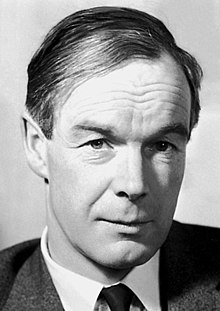Alan Lloyd Hodgkin
Sir Alan Lloyd Hodgkin (born February 5, 1914 in Banbury , Oxfordshire , England ; † December 20, 1998 in Cambridge , England) was a British physiologist , neurophysiologist and biophysicist who worked in 1963 with Sir John Carew Eccles and Andrew Fielding Huxley for the “Discoveries about the ion mechanism that takes place during excitation and inhibition in the peripheral and central areas of the nerve cell membrane” was honored with the Nobel Prize in Physiology or Medicine .
education
Hodgkin attended Downs School in Malvern (1923-1927), the Greshams School in Holt (1927-1932) and then Trinity College in Cambridge (1932-1936), where he took biology and chemistry and devoted himself to the study of physiology. He then became a research assistant and carried out experiments with frog nerves. He worked among others with the scientists Ernest Rutherford and Frederick Gowland Hopkins . After an invitation to work at the Rockefeller Institute in New York (1937-1938) he returned to Cambridge, where his collaboration with Huxley began in 1939 and he also found his home.
research
The neurophysiological work for which the research team received the Nobel Prize was carried out on the giant axons of squids , which are particularly suitable for research because of their size. The Goldmann-Hodgkin-Katz equation is named after him, according to which the resting membrane potential of cells can be calculated.
Together with Andrew Fielding Huxley he developed the Hodgkin-Huxley model , a biologically detailed neuron model that is important for computational neuroscience and neuroinformatics .
Further honors
Hodgkin received a variety of honors. In 1948 he was elected as a member (" Fellow ") in the Royal Society , which awarded him the Royal Medal in 1958 and the Copley Medal in 1965 . In 1962 he was elected to the American Academy of Arts and Sciences , in 1964 a member of the Leopoldina and in 1967 of the American Philosophical Society . In 1972 he was knighted ("Knight Commander" of the Order of the British Empire ); In 1973 he was awarded the Order of Merit . In 1974 Hodgkin was elected to the National Academy of Sciences and an honorary fellow ( Honorary Fellow ) of the Royal Society of Edinburgh .
literature
- Renate Wagner: Hodgkin, Sir Alan Lloyd. In: Werner E. Gerabek , Bernhard D. Haage, Gundolf Keil , Wolfgang Wegner (eds.): Enzyklopädie Medizingeschichte. De Gruyter, Berlin / New York 2005, ISBN 3-11-015714-4 , p. 607.
Web links
- Information from the Nobel Foundation on the 1963 award to Alan Lloyd Hodgkin
Individual evidence
- ↑ Renate Wagner: Hodgkin, Sir Alan Lloyd. 2005, p. 607.
- ^ Member History: Sir Alan L. Hodgkin. American Philosophical Society, accessed October 2, 2018 .
- ↑ entry on Hodgkin; Sir; Alan Lloyd (1914-1998); Neurophysiologist in the Archives of the Royal Society , London
- ^ Fellows Directory. Biographical Index: Former RSE Fellows 1783–2002. (PDF file) Royal Society of Edinburgh, accessed December 20, 2019 .
| personal data | |
|---|---|
| SURNAME | Hodgkin, Alan Lloyd |
| BRIEF DESCRIPTION | English biochemist and Nobel Prize winner |
| DATE OF BIRTH | February 5, 1914 |
| PLACE OF BIRTH | Banbury , Oxfordshire |
| DATE OF DEATH | December 20, 1998 |
| Place of death | Cambridge |
